1. Favourite knob/fader/switch on a piece of gear and why?
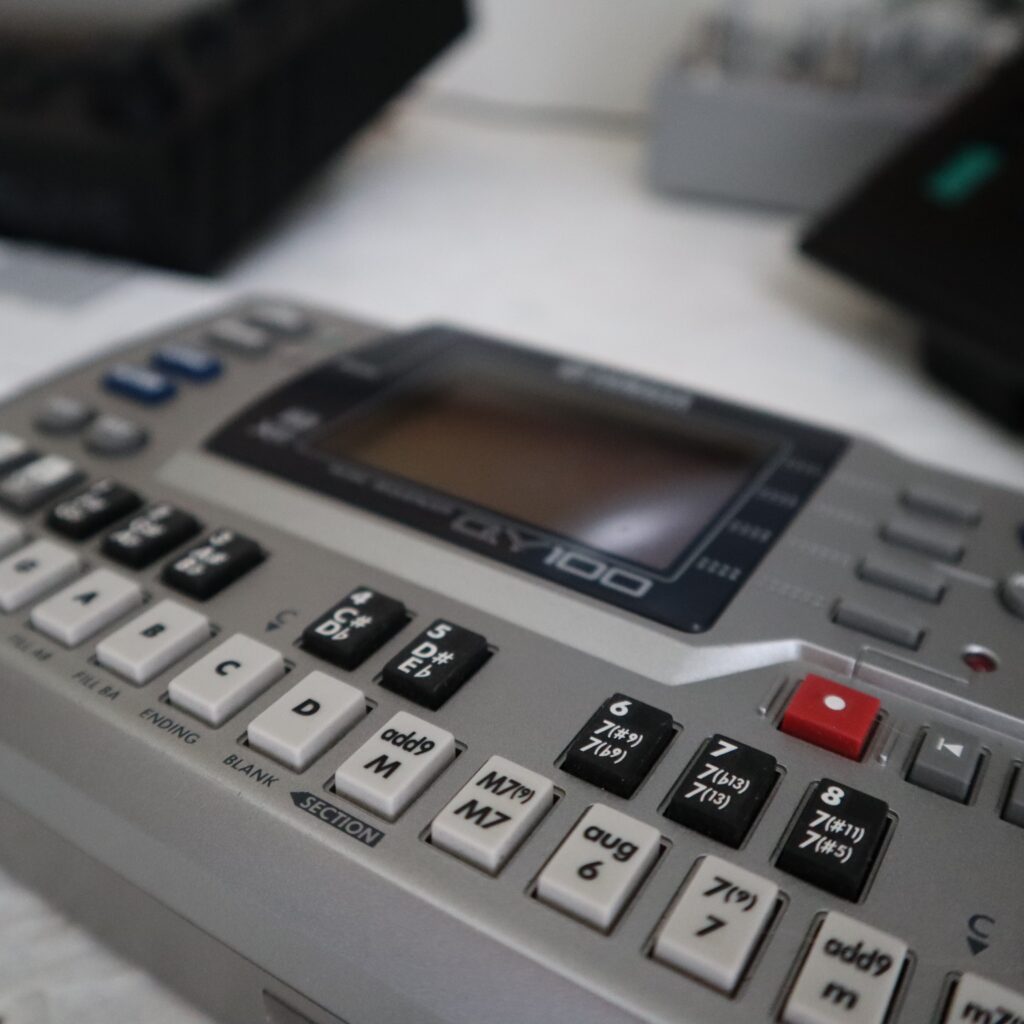
I actually really love the keys for the QY-100/QY-70. They are cute little rubber calculator buttons that work keyboard keys and data entry. They’re not velocity sensitive, they’re probably too bouncy for most, but for me there’s something very pleasant about both their form factor, and the sensation of playing on them. I think the LCD reminds me of old “Tiger” hand held games, and the buttons remind me of old casio calculators, and the QY itself kind of reminds me of a gameboy, so the whole package together really helps me get in touch with a playful, less serious side of my musical self. Also, I have pretty small hands, so the size of the keys allows me to play parts that I would never attempt on a full size keyboard which can lead to some really interesting voicings.
2. Do you have an ‘almost’ perfect bit of kit? What would you change?
All of it! Every instrument is “almost” perfect. Part of the fun of making art through technology is the game of asking “what would make this even better?” Of course, at some point you have to sit down and make something, so it’s usually wise to wipe that question from one’s mind and treat any limitations as a creative challenge.
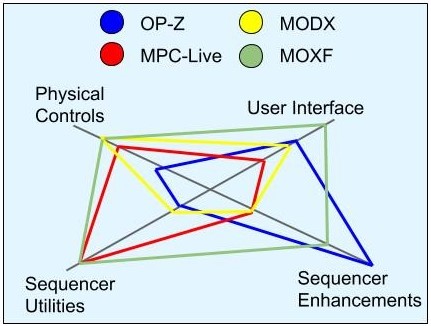
Sometimes I draw a diagram to help me figure out how I feel, here’s one that’s kind of like a character creation stats screen from a video game:
OP-Z has really cool sequencer effects, but is very light on editing utilities and the actual buttons to trigger notes are not super pleasant to use. MODX is very pleasant to play physically/tactilely, but the midi sequencer is more of a midi recorder with very light quantization and velocity editing, plus some minor non-destructive variation via the “play FX.” The MPC Live of course is amazing as a MIDI writing tool and has tons of editing capabilities, but the UI takes me some time to get my head around, and the sequencer randomizations are destructive edits so any given randomized pattern still sounds exactly the same, which is not the way that I prefer to use probability in my music.
My favorite sequencer is probably still the one on the Yamaha MOXF (a.k.a. the baby Motif that came out before the MODX), but the one thing I wish they had kept from the QY100 user interface was the “undo” shortcut. On the QY-100 (and QY-70, I think) you can hold “shift” and press the “job” button and it will undo whatever you just did, which is really nice. However, on the MOXF you have to actually go into the “job” menu and click at least one more button to undo the last action (two more button presses if the “undo” menu isn’t already showing!).
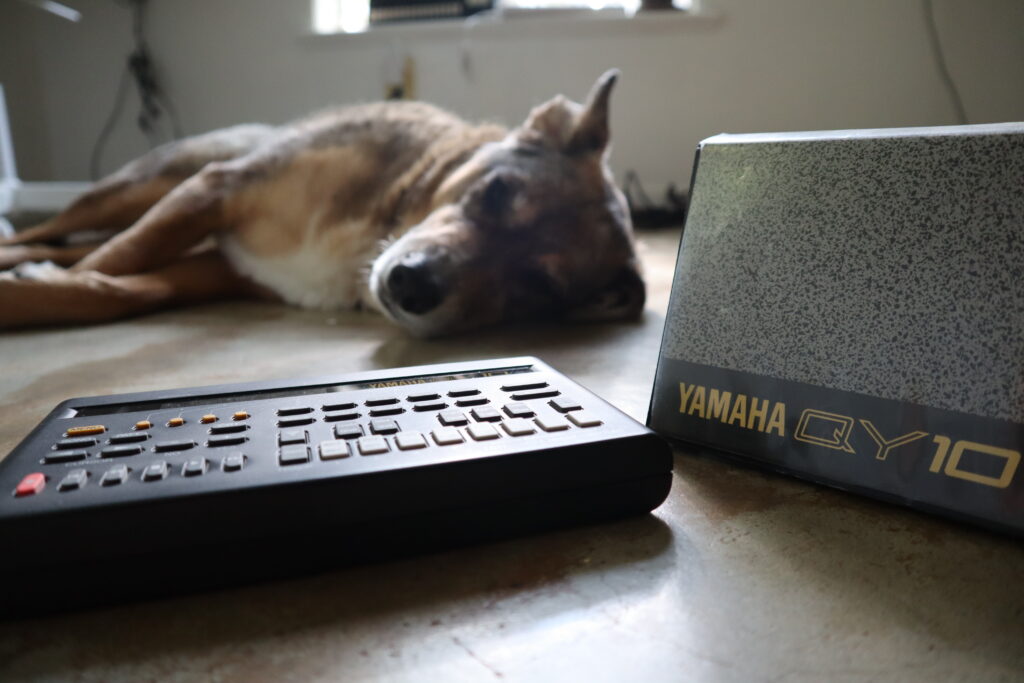
3. What setup do you bring on holiday/tour/commute etc.?
Usually op-1, Nintendo Switch or my 2DS. I love the op-z but sometimes it’s buttons are a little frustrating when I don’t have the device on a table top and I have yet to gel with the hand-held thumb-pressing grip I’ve seen some people use. The op-1 is usually what I’ll pick for a flight, since it’s a delight to play and the battery life is good enough to handle even the weirdest of connecting flight tom-foolery. The 4 track tape workflow of the op-1 is great for off-the-cuff creation which helps me stay in tune with my surroundings so I can draw on my environment for inspiration. With the nintendo switch I can use it to play games, or I can compose using Korg Gadget (an incredibly capable mini-studio), but the hand-held nature of the device means it’s a little more friendly to situations where I may not have a lap, or I’ll be getting up and down a lot. If I really need to go small I bring the Nintendo 2DS which has decent battery life, is super small, and I can run the Korg DSN-10, DSN-12 or MD-01 software.
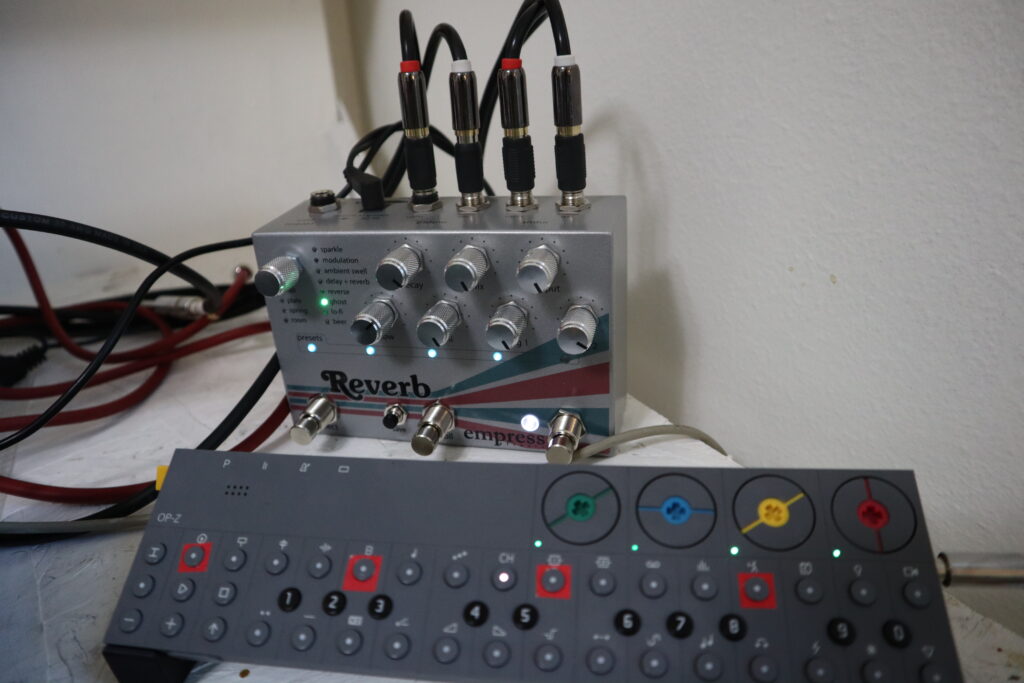
4. What software do you wish was hardware and vice versa?
I wish the original Native Instruments Massive plugin was a stand-alone piece of hardware. I LOVE it’s sounds and incredible routing flexibility, but don’t love having to run a standard operating system, sound card, video card, etc. just to get to it.
5. Is there anything you regret selling… or regret buying?
I did regret selling my Volca Keys, but I have since re-bought it already 🙂
I am generally not too precious about holding onto my gear, I sort of treat the second-hand market like a synth library. With each synth I buy and eventually resell sometimes I make money, but more usually I lose about 10-15% of what I paid for it. I consider that loss essentially my membership fee for being a synthesizerist.
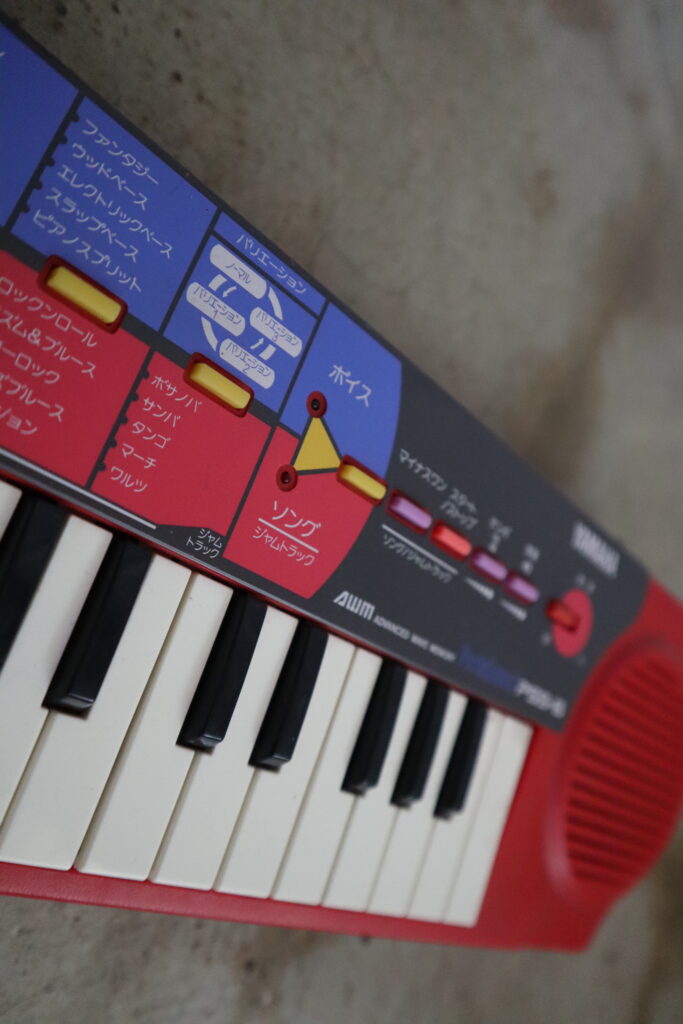
6. What gear has inspired you to produce the most music?
Old-school “Yamaha-style” sequencers. My first and greatest love in this regard was and still is the MOXF. The MOXF itself is like a budget version of the Motif, but the variations of that core sequencer engine are also present in the QY series and a few other preceding machines.
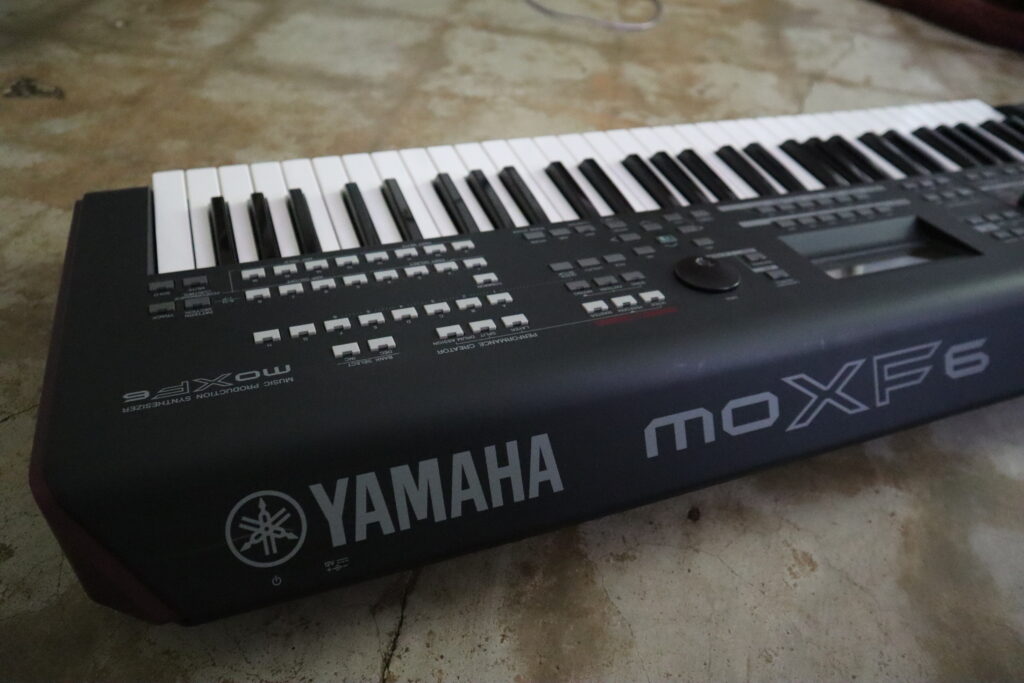
The midi sequencer has 3 modes: 1 for live-tracking midi record-style, a second a step-edit mode that uses staff lines and music notation, and an event list editor that just has a textual list of every midi event in chronological order. I’ve never been great at reading music, but I don’t find the typical midi piano roll particularly exciting for some reason. So these alternate visualizations are really nice to me.
The 16 track version of this sequencer that is in the MOXF lets you do stuff like put a 3 measure long loop next to a 17 measure loop in the same pattern (up to 256 measures!). You can also record parameter changes and whatnot for some really fun experimentation that I’ve only ever been able to duplicate with Ableton.
These sequencers do a crazy blending of pattern based groove box type functionality with a sort of classical/pop vernacular. It ends up creating a tool that is highly effective if you put in the time to learn all it’s features, but ultimately very stylistically unopinionated.
The MOXF boots up in 7 seconds, and then I’m writing songs and depending on whether I feel like tracking into a recorder, or programming in some stuff on the step editor it’s all ready to go in a stable and dependable package.
7. If you had to start over, what would you get first?
Honestly, I wouldn’t change a thing!
I am very much informed by exploration of whatever raw material is in front of me, but when I first got interested in bedroom recording, I started with crummy consumer arranger keyboards, a 4-track tape machine, and fruity loops. I think the challenge of trying to make music I liked with those raw pieces helped develop a mindset that there is a corner of every piece of equipment that will be the exact right thing for some song. It’s more important to use whatever you have and put in time with it, ultimately and I think my path led me to that conclusion pretty early on. It is always worthwhile to focus on your own technique in order to shore up what your instrument can’t do for you. Electronic music is definitely a conversation with manufacturers, a collaboration with their design team… but it’s important to remember that you are ultimately responsible for making good music.
When I was learning the trumpet as a young goober, I didn’t ever stop and think “This thing should have a fourth valve, then I’d really be killing this cover of the jurassic park theme song.” I just thought: “Man, I need to practice and get better at this instrument.” Then I’d go play megaman X instead. But the point is, I didn’t blame the company that made the trumpet for it.
That’s not to say that manufacturers shouldn’t be held responsible for ripping people off, or phoning in their designs, but I think as creators we have to take responsibility for our part too.
8. What’s the most annoying piece of gear you have, that you just can’t live without?
By far it is the personal computer. I get so frustrated wrestling with sound drivers and forced OS updates, but it is impossible to publish material in the digital age without some form of computer (or mobile/tablet device).
I tend to work best if I’m composing a little at a time, maybe 20-30 minutes a day with a longer session once or twice a week. So in order to avoid wasting a lot of time waiting for a computer to boot up and disconnecting/reconnecting USB devices, I typically choose a single device that boots up quickly. Working with dedicated devices like the MPC Live, or keyboard workstations like the MOXF/MODX are my happy place.
But at some point, I have to figure out how to get that material into a publishable format. Sometimes, like with the MPC Live, I’ll export the tracks as stems to mix on my computer. Or if I did some writing on the MODX, I’ll stream all the separate tracks into Ableton to mix and master. Other times I’ll do the arranging and mixing on the device like with the OP-Z or the MOXF and then just record a stereo mix onto my computer for mastering, naming and uploading the files to bandcamp or DistroKid.
The point is that at some juncture, my material has to cross through that membrane, and I find the more work I do on the pre-computer side of that divide, the more I enjoy myself. That said, I often prefer the end result of the projects that are closer to 50/50. Maybe it’s a bit more tedious in the later stages, but if I do my mixing in the computer it often sounds better, and I can do it faster. At least at my current skill level with dedicated hardware.
Something I’ve been working on lately to combat this aversion to the personal computer as an art tool is to really invest a ton of time into a piece of software that excites me: Sunvox. It’s a tracker/modular synth that’s free and open-source for PC/Mac/Linux. TBD on if that helps me make good art, but I am enjoying working with the computer more!
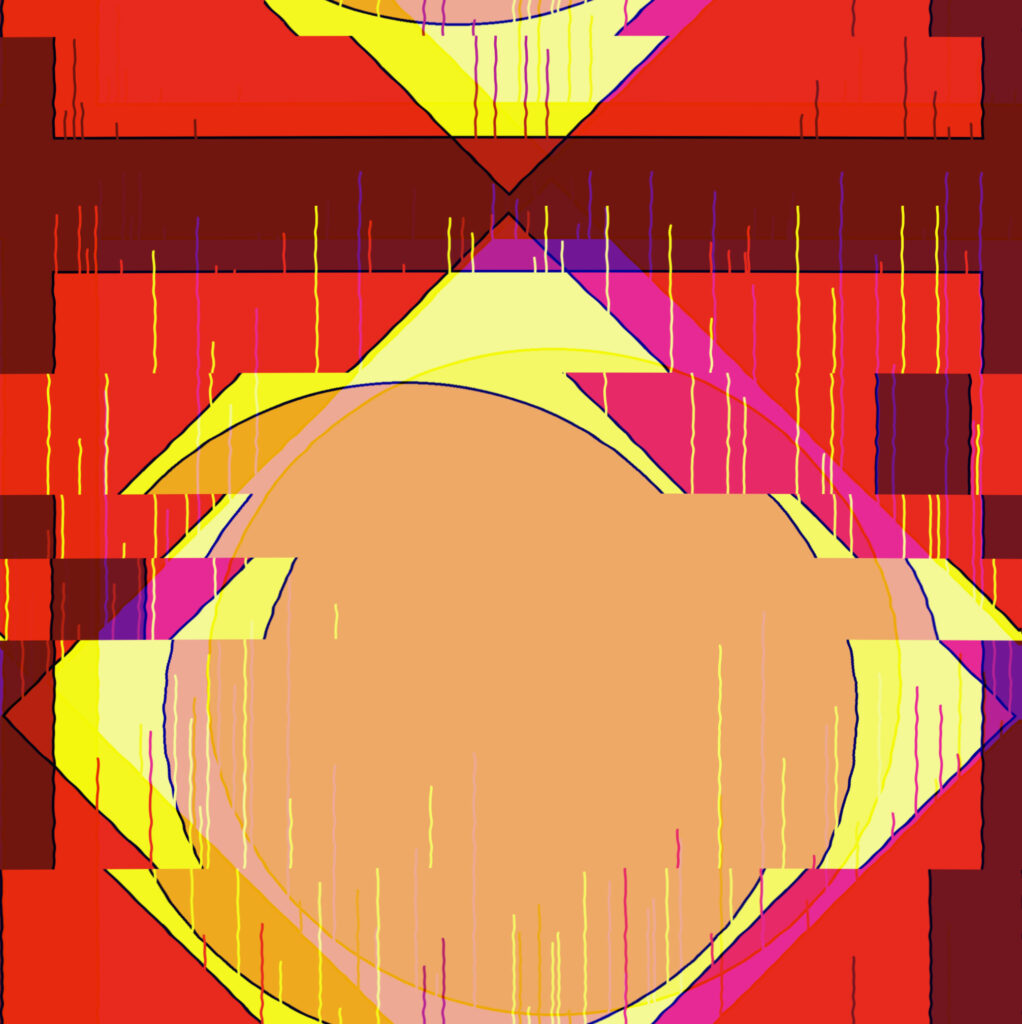
9. Most surprising tip/trick/technique that you’ve discovered about a bit of kit?
Actually, it’s one of yours Martin. I saw a video on Youtube that you posted about how to use blank samples and assign them to layers that can be randomly triggered for an MPC Live keyboard program and it blew my mind. The end result was that you added a note trigger probability to an instrument that didn’t have that functionality. You found a way to work with what was already there and get the functionality you needed and I thought it was brilliant. I actually prefer the end result of that more than the randomness that they eventually added in a firmware update!
[Editor: I’m glad you found my youtube useful. I gotta admit though, that I believe that I got that trick from either MPCHead or TubeDigga’s channels… and embarrassingly I forgot which one]
Artist/Band name:
Scott Brackett/thebrackett
Genre
Ambient-ish, pop synthy, lo-fi hip-hop …wave?
Selfie
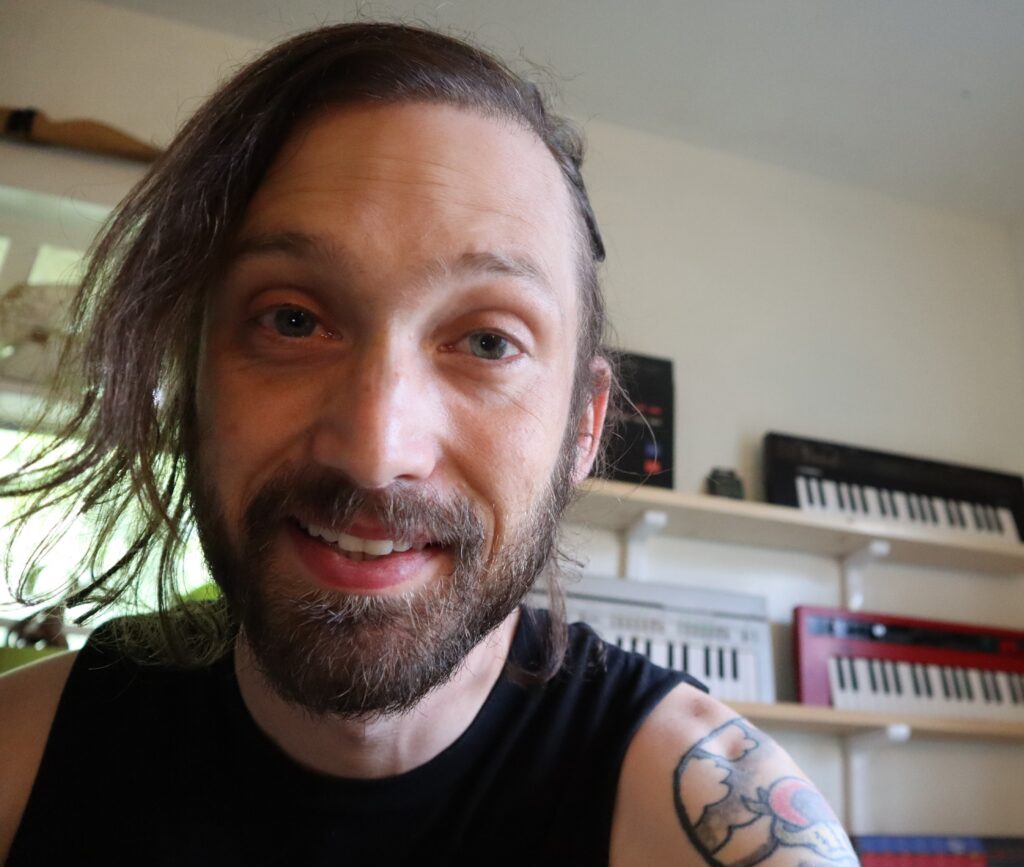
Where are you from
Northern California originally, but have been in Austin Texas for about 15 years.
How did you get into music?
When I was in maybe 4th grade I joined the brass band at my public school. I originally wanted to play saxophone because of Lisa Simpson, but I panicked when they asked me and I picked trumpet, so that’s what I ended up with. I pretty quickly started trying to pickout 16-bit JRPG soundtracks by ear which led me to also playing keyboard and piano. I still played horns but also got into guitar and drums in my teen years. Eventually I settled into the “utility player” role because I could kind of pick up whatever and at least hold down a simple part, but my staples were usually cornet/trumpet, hand percussion and keyboards.
What drives you to make music still?
Playing music helps me to be with loved ones who are no longer here, dream up worlds that I’ve never been to, and connect with the kindest part of the universe I’ve ever met, in a way that I cannot find anywhere else.
I’ve got kind of a long story to explain what I mean:
My decision to stick with trumpet as a lad allowed me to take advantage of the great horn boom of the early aughts. Seems like you couldn’t swing a singer-songwriter without hitting an essential trumpet line for a folk-rock song, at that time. That serendipitous backdrop and my pleasant demeanor landed me in a touring band called “Okkervil River” in 2005. Their horn player dropped out a few weeks before a tour opening up for a band called “The Decemberists” and so I dropped out of college to go see if I could hack it playing in a “real” band.
I toured hard in several bands for the next 8 years and got to learn from some amazing musicians along the way. One of them, Travis Nelsen (who passed away a few weeks ago) taught me a lot about rhythm, stage presence and remembering to have fun with music.
Trav would do this thing where he would throw a stick way up in the air and then instead of catching it, he would pull another one out of his pocket right before coming back in on a nice sludgy ringo-style tom fill. Just when you thought: “there’s no way he’s going to catch it,” he would pull out the other stick and come back into the song with a smile on his face.
Travis was also notorious for his hard-hitting style. Some of his magic was not to do with how hard he hit the drums, but with how he played with timing. When he wanted a fill to really stand out, or a snare to really land hard, he’d let it drag a little bit later than you’d think would be musical, but that would mean the other instruments were already decaying on that beat, and so there would be this little space for the drum part to just come out pop you right in the face.
Off stage there wasn’t a tour where he didn’t look around at some point and make sure we all acknowledged how lucky we were to be playing music every night. On stage he would always go out of his way to try and get me to smile at some point in the show.
That’s a long way to answer your question, but the point is this:
My musical habits are little fractal grains of my personal experiences, seeded by the influences of the wonderful people that I have known and loved in my life. During creative acts, you get to spend time with all the moments that led up to that point.
Yes, I love to share my music and I hope other people like the end product, but making it and/or performing it allows me to access something that I simply can’t get from any other activity.
Best creative advice you’ve ever heard?
In the studio:
Limitations are key to creativity. If you are stuck or feel uninspired, remove some options.
On the stage:
Be yourself. I know it seems trite. But hear me out… if you struggle on stage, that struggle will resonate with certain folks. If you are effortless on stage, that will also resonate with certain folks. Just spend time being the most “you” that you can be.
Show us your current studio
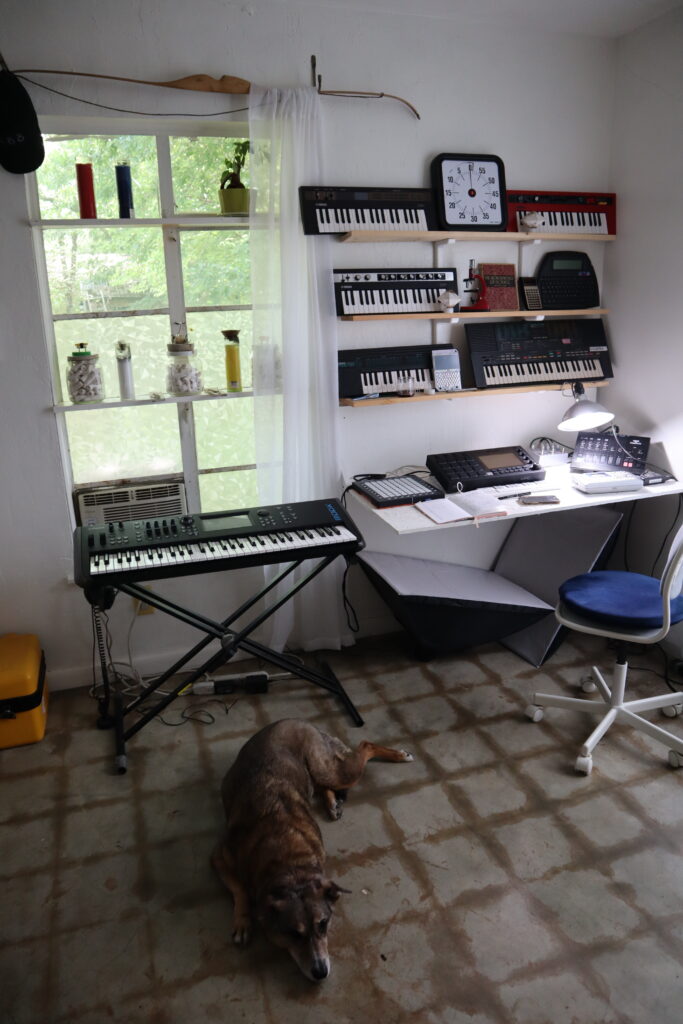
Promote your latest thing… Go on throw us a linnk
Here are the last two EP’s I did.
An Ambient album made using a multi-tracked Microbrute as the only sound source:
https://distrokid.com/hyperfollow/scottbrackett/popsicle
Here are the last two EP’s I did:
An Ambient album made using a multi-tracked Microbrute as the only sound source:
https://distrokid.com/hyperfollow/scottbrackett/popsicle
An ambient album using a multi-tracked Korg Volca Key as the only sound source:
https://distrokid.com/hyperfollow/scottbrackett/newtonian
Here’s my last full-length album
A lo-fi groovy synthwav-ey full-length. I used the OP-Z for all but a few overdubs:
https://distrokid.com/hyperfollow/scottbrackett/pocket-dimension
Also, check out my Youtube channel if you want…
https://www.youtube.com/thebrackett
[Editor: Do you have any of the gear in this article? Then why not share a tip or trick? Leave a comment below]